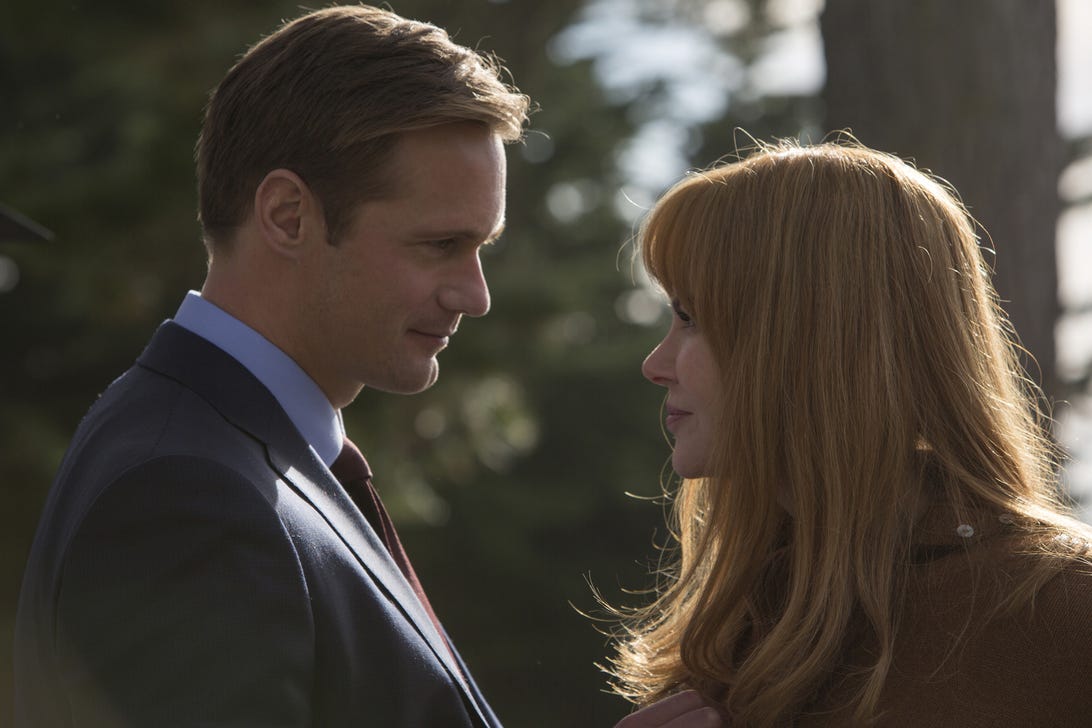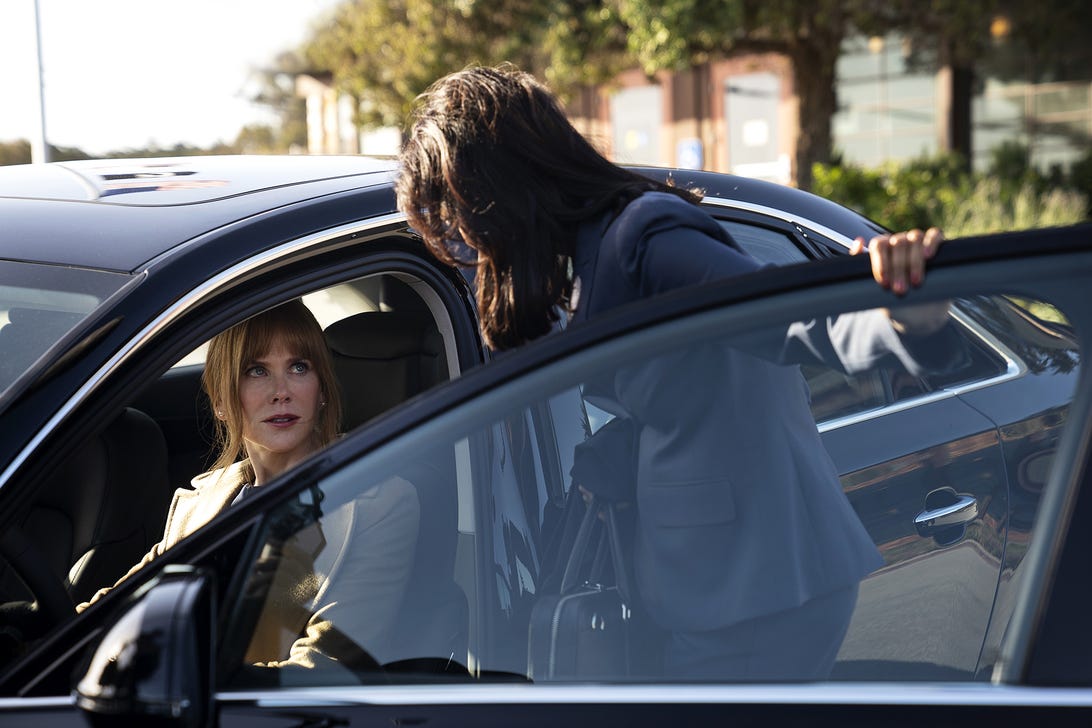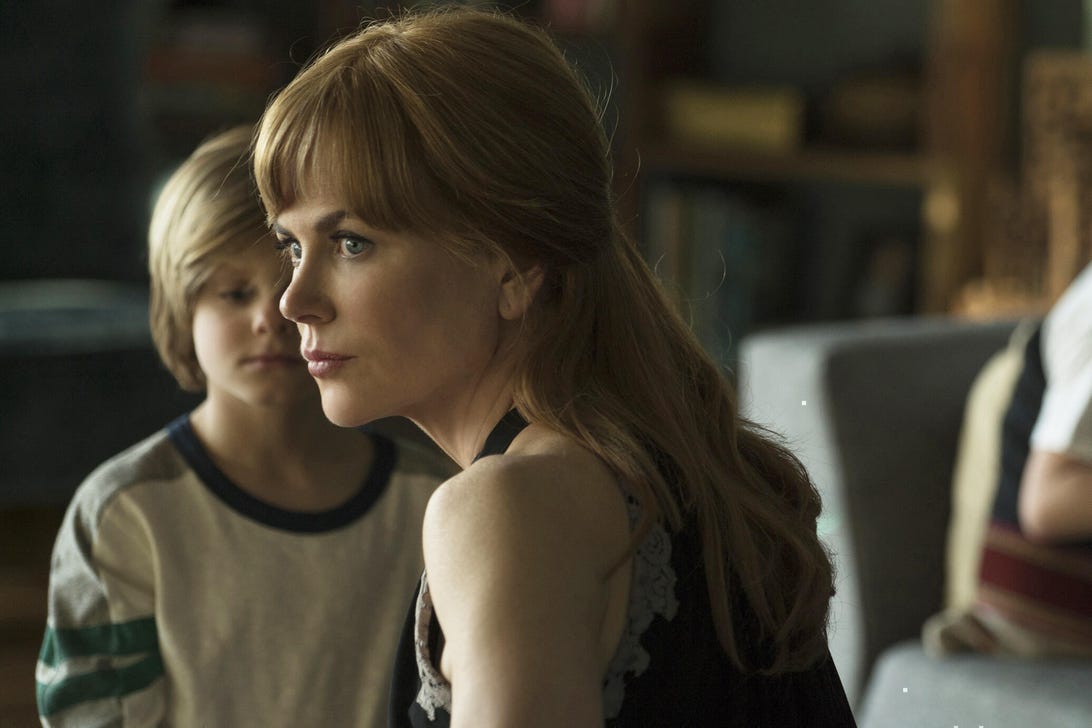
'Big Little Lies' Season 2 Accurately Captures What it Feels Like When Your Abuser Dies
This season wasn't perfect, but it offered solace to those who can identify with Celeste's experience.
At the beginning of the second season of Big Little Lies, Jane (Shailene Woodley) asks Celeste (Nicole Kidman) if she's glad Perry (Alexander Skarsgard) is dead. Celeste pauses, and then says "It's complicated." When the new season of Big Little Lies premiered, I saw so many people tweet that they wished they were in Celeste's position of their abuser being dead. I used to wish the same thing all the time.
In January 2018, one of my mom's best friends sent me a Facebook message that read, "Did you hear about Joe*?" As soon as I saw it, I thought "I hope the motherf--er is dead." But as soon as I knew he was gone, a flood of emotions came through. I couldn't sleep. I was relieved that there would be no chance for him to ever enter my life again, or abuse others. But at the same time, I lost someone I had genuinely cared for. A first love--if you can even call it that. I meant what I said -- that I wished he was dead -- but I kept reminiscing over the good memories from our relationship. Like Celeste's urge to replay Perry's moments of documented sweetness on her laptop, I found myself thinking back to kisses shared in between cigarette drags, late-night cuddling by the beach, and those moments that felt like a teenage girl's dream relationship.

I met Joe when I was 16 through friends of friends on a night out. Our connection was immediate. He knew exactly what to say to make me feel special. Joe would send morning texts telling me how much he cared, would reassure me that I was beautiful when high school bullies' harsh words would get to me. Much like Perry, he would tell me that there is nobody he'd loved as much as me, slowly centering my world around a need to reciprocate that intensity.
Joe's need for control started small, putting down my interests and opinions. He'd belittle something about me; I'd challenge him back. I read it as regular banter, but it was a red flag I was oblivious to.
He never actually shifted his perception of anything. The more I'd stand up for myself, the harder he'd push back. Soon after, the abuse shifted from verbal and emotional to physical. We were at his house, alone, because his parents were out of town. I had already told him I didn't want to have sex. But when my mom texted to say she was on her way to pick me up, he pinned me to the bed, unsatisfied with just making out. I kept trying to push him off until I successfully broke free. But as I attempted to leave, he stood in front of the door, forcefully pulling my arm to make me stay. I managed to make it out the door after pushing my way through.
That night after the incident, I told my aunt about it (whose husband is related to one of his dads), and she then told my mom. They had mixed feelings about what had happened. They didn't believe I should've gone home with him in the first place, but they did consider his actions to be alarming. They never used the words "abuse" or "attempted rape."

I felt this immense anxiety and fear after that night. I didn't understand how someone who said he cared about me so much could do something like that. But, at the same time, I made up excuses for him. Maybe he was too caught up in the moment, or thought I was into rough play. I didn't want to think that someone I loved was capable of hurting me physically.
When I watched this season of Big Little Lies, I saw bits of myself in how Celeste was able to stay with Perry, holding onto denial as their relationship grew more violent. It's not that she was addicted to the violence, as her terrible therapist Dr. Reisman (Robin Weigert) accused her of, but rather, when you love someone so intensely, it's not easy to reconcile the fact that you can't fix their harmful behavior. Perry had convinced her that nobody loved her as much as he did, often disguising his violent outbursts as foreplay. Though Joe's actions hadn't escalated to that level, I recognize the feeling of confusion and pain she must've felt looking back.
After that incident with Joe, I mustered the courage to call him out on his behavior via text. He responded saying that he was just too caught up on wanting to be with me, which to any 16-year-old sounds like blissful, all-consuming love. I was so enamored by him that it was simple to push any uneasy feelings aside, and continue dating him. But he never apologized. And the more I spent time with him, the more he'd deride me. Everything I did was wrong. I was too dumb for him. But then he'd tell me he loved me, and I'd fool myself into thinking that his love was stronger than anything else he'd done. And perhaps by calling him out, I would change his behavior for good.

Our relationship didn't last long after that, but the cycle did continue for a while. He'd tell me not to be clingy at a party, but later start touching me intimately in front of people when he saw I was having a good time without him. He'd expect me to leave with him and get angry when I refused. He'd drag me by the arm, trying to force me into his car. Each time we'd be together and I'd call out his harmful behavior, he'd gaslight me into thinking it was all my fault, and that I was making a big deal out of nothing just to pick a fight.
The last time we spoke was when I was in college. He told me he had just started seeing someone new, and was forcing her to stop using birth control. He bragged about how much power he had over her. At that point, I was dealing with the aftermath of being raped my freshman year, and the last thing I needed was to be in contact with my abuser, so I blocked him on all social media and cut him out of my life.
But the thought of him out there, mistreating other women the way he did with me, haunted me for years. The trauma caused from my experience with him made me wary of starting a relationship with anyone else. After his death, I expected a modicum of relief. But his death brought up new tribulations. I joked with my friends that I was happy he was dead, but in reality I didn't know how to process my emotions. Part of me felt guilty for wanting him gone, and wondered if he ever truly loved me. But I also recognized that his behavior was abhorrent, and there was a reason why I cut him out of my life in the first place.

This season of Big Little Lies wasn't the perfect finale for fans, but for me it became a vital moment on TV, because it helped me and others feel like I wasn't alone in how I processed my experience with an abusive partner who is dead. Celeste works through her guilt of being a participant in his death, while also struggling with the absence of the love of her life. She slowly comes to terms with leaving behind the positive memories and focusing on how better off she is without him, deleting his videos from her laptop in the finale. She also finds solace in Jane, bonding over their process of recovery from their trauma.
Through Celeste's story, Big Little Lies has the capacity of sparking nuanced conversations about abusive dynamics, showing that there's not one way to process the loss of a harmful loved one. Feeling love or sympathy towards your abuser doesn't mean you deserve to be abused. In fact, if there's anything that watching Celeste fight to get her life back shows us, it's that we deserve to move on. No matter how complicated that process might be.
*Name has been changed.
Big Little Lies is now streaming on HBO.
